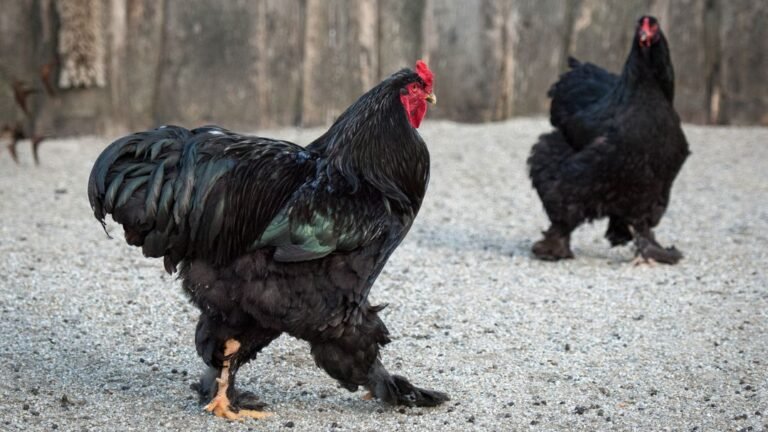Ten small chicken breeds that are beginner-friendly include Silkies, Bantams, Seramas, Polish, Belgian d’Uccles, Wyandottes, Easter Eggers, Cochin, Hamburgs, and Sussex. These breeds are a great choice for first-time chicken owners due to their manageable size and docile nature.
They are easy to care for, require less space, and are known for their gentle temperament, making them ideal for families and individuals new to raising chickens. Whether you have limited backyard space or simply want a small and friendly addition to your flock, these beginner-friendly chicken breeds are excellent options.
Choosing The Perfect Chickens
When it comes to raising backyard chickens, selecting the right breed is crucial. Choosing chickens that are beginner-friendly can make your poultry-raising experience easier and more enjoyable, especially if you are new to the world of chickens. Small chicken breeds are particularly ideal for beginners, as they require less space, are easier to handle, and are generally more docile. In this section, we will discuss the various factors to consider when selecting chicken breeds, as well as the importance of choosing small breeds for beginners.
Factors To Consider When Selecting Chicken Breeds
Before acquiring your chickens, there are several factors you should consider to ensure you choose a breed that best suits your needs and circumstances. These factors include:
- Available Space: Assess the size of your backyard or the space you have dedicated for the chickens. Different breeds have varying space requirements, and it’s important to select chickens that can comfortably thrive in the given area.
- Climate Suitability: Take into account your local climate conditions. Some chicken breeds are more tolerant of cold or hot climates, while others may require special care in extreme weather.
- Egg Production: Determine whether you want chickens primarily for egg-laying purposes. If so, select breeds known for their high egg production and consistent egg size.
- Personality: Consider the temperament and behavior of the chicken breeds you are interested in. Some breeds are more friendly and docile, making them easier to handle, while others may be more prone to aggression or flightiness.
- Sustainability: Think about the long-term sustainability of the breed. Some heritage or rare breeds require extra attention and specific breeding techniques to ensure their survival.
The Importance Of Choosing Small Breeds For Beginners
For beginner chicken enthusiasts, opting for small chicken breeds offers several advantages. These breeds are often more manageable and require less specialized care, making them an excellent choice for those new to raising chickens. Here are a few reasons why small chicken breeds are perfect for beginners:
- Space Efficiency: Small breeds require less space than larger breeds, making them ideal for urban or limited backyard settings. If you have a small backyard or plan to raise chickens in an urban area, small breeds can happily flourish in a more confined space.
- Easy Handling: Handling larger chicken breeds can be a challenge, especially for beginners. Small breeds are generally more lightweight and easier to handle, making tasks such as routine health checks, handling for veterinary purposes, and overall interaction simpler and safer.
- Docile Nature: Small breeds are often known for their friendly and gentle nature. They tend to be more sociable, making it easier to form a bond with your chickens and enjoy interacting with them. Furthermore, their calm demeanor can reduce the likelihood of aggressive behavior or confrontations among flock members.
- Maintenance Effort: Raising chickens involves regular maintenance, such as cleaning the coop, providing food and water, and ensuring their overall well-being. Small breeds generally require less feed and produce fewer droppings compared to larger breeds, reducing the overall maintenance effort required.
By considering these factors and selecting small chicken breeds, you can set yourself up for a successful and rewarding chicken-raising journey. Now that you understand the importance of choosing the right breed, let’s explore some of the small chicken breeds that are perfect for beginners in our upcoming section.
Characteristics Of Small Chicken Breeds
Understanding The Traits And Behavior Of Small Chicken Breeds
When it comes to keeping chickens, small breeds are a popular choice among beginners. Not only do these compact feathered friends require less space, but they also offer a variety of advantages for novice keepers. In this section, we will delve into the characteristics of small chicken breeds, ensuring you have a clear understanding of their traits and behavior.
Adaptability And Ease Of Care For Novice Keepers
One of the key traits of small chicken breeds is their adaptability. These birds are known for their ability to adjust to various climates and living conditions. Whether you reside in a small urban backyard or a spacious rural setting, small chicken breeds can thrive easily. Their small size allows them to navigate confined spaces effortlessly, making them ideal for those who have limited coop space.
Furthermore, small chicken breeds are known for their ease of care. For beginner chicken keepers, this is a significant advantage. Unlike larger breeds that demand more attention and require a higher level of care, small breeds are more low-maintenance. Their petite size means they consume less feed, and their compact bodies are less prone to certain health issues. This makes them the perfect choice for beginners who want to dip their toes in chicken keeping without feeling overwhelmed.
Temperament And Behavior
In addition to their adaptability and ease of care, small chicken breeds also possess friendly and docile temperaments. These birds are known for their gentle nature and can be easily handled, making them ideal for families with children. Their smaller size and calm nature also mean they are less likely to become overly aggressive or territorial. However, just like any chicken breed, it’s important to provide proper care, socialization, and a safe environment to ensure a well-behaved flock.
When it comes to egg-laying, small chicken breeds are not to be underestimated. While they may not produce jumbo-sized eggs like larger breeds, they are consistent layers and can provide fresh eggs for your breakfast table regularly. Additionally, their small eggs have a distinct charm and can be a delightful addition to your collection.
Overall, the characteristics of small chicken breeds make them an excellent choice for beginner chicken keepers. Their adaptability, ease of care, friendly temperament, and egg-laying abilities ensure a rewarding experience for both you and your feathered companions. So, whether you’re a curious aspiring chicken keeper or a seasoned enthusiast looking to expand your flock, considering small chicken breeds is a decision you won’t regret.
Top 5 Small Chicken Breeds For Beginners
Breed 1: [breed Name]
Description and key features
Temperament and suitability for beginner keepers
Breed 2: [breed Name]
Description and key features
Temperament and suitability for beginner keepers
Breed 3: [breed Name]
Description and key features
Temperament and suitability for beginner keepers
Breed 4: [breed Name]
Description and key features
Temperament and suitability for beginner keepers
Breed 5: [breed Name]
Description and key features
Temperament and suitability for beginner keepers
Breed 1: [breed Name]
Description and key features
Temperament and suitability for beginner keepers
Breed 2: [breed Name]
Description and key features
Temperament and suitability for beginner keepers
Breed 3: [breed Name]
Description and key features
Temperament and suitability for beginner keepers
Breed 4: [breed Name]
Description and key features
Temperament and suitability for beginner keepers
Breed 5: [breed Name]
Description and key features
Temperament and suitability for beginner keepers
Care And Maintenance Of Small Chicken Breeds
When it comes to raising small chicken breeds, ensuring their proper care and maintenance is crucial for their health and productivity. These delightful feathered friends may be small in size, but they require just as much attention and care as larger chicken breeds. In this section, we will discuss the housing requirements, feed and nutrition guidelines, as well as common health ailments to watch out for when raising small chicken breeds.
Housing Requirements For Small Chicken Breeds
Providing appropriate housing for small chicken breeds is essential to keep them safe, comfortable, and stress-free. Here are some important considerations:
- Coop size: Ensure your coop has enough space to accommodate the number of chickens you intend to keep. A general guideline is to allocate at least 4 square feet per chicken.
- Roosting bars: Install sturdy roosting bars at varying heights to allow your chickens to perch comfortably. A 2-inch width is recommended for small chicken breeds.
- Nesting boxes: Provide nesting boxes filled with soft bedding material for your hens to lay their eggs. Aim for one nesting box per 3-4 hens.
- Ventilation: Ensure proper ventilation in the coop to maintain good air quality and prevent the buildup of harmful ammonia fumes.
- Protection from predators: Secure the coop with sturdy fencing and wire mesh to protect your chickens from predators such as rodents, raccoons, and birds of prey.
Feed And Nutrition Guidelines
Feeding your small chicken breeds a balanced and nutritious diet is essential for their overall health and productivity. Follow these guidelines to ensure they receive the nutrition they need:
- Commercial feeds: Choose a high-quality commercial feed specifically formulated for small chicken breeds. These feeds are usually available in crumble or pellet form.
- Supplement with kitchen scraps: Provide occasional treats of kitchen scraps such as fruits, vegetables, and cooked rice. However, avoid feeding them anything toxic, such as chocolate, onions, or avocados.
- Grit and calcium: Offer a separate container of poultry grit to aid digestion, and provide a calcium source, such as crushed oyster shells, to support eggshell formation.
- Fresh water: Ensure a constant supply of clean, fresh water for your chickens. Use sturdy waterers and clean them regularly to prevent bacterial growth.
- Free-range opportunities: If possible, allow your small chicken breeds to free-range in a safe and supervised area, where they can forage for insects and enjoy natural vegetation.
Health And Common Ailments To Watch Out For
Keeping your small chicken breeds healthy is vital for their longevity and well-being. Stay vigilant for any signs of illness or common health issues, and take necessary measures when needed:
- Parasites: Regularly inspect your chickens for external parasites such as mites and lice. Treat them with appropriate anti-parasitic remedies to prevent infestations.
- Vaccinations: Consult with a veterinarian to determine if vaccinations are necessary for your specific chicken breeds. Vaccinations can protect against common diseases such as Marek’s disease or Newcastle disease.
- Respiratory issues: Monitor your chickens for any signs of respiratory distress, such as coughing, wheezing, or nasal discharge. Provide good ventilation and isolate infected birds to prevent the spread of infections.
- Egg-related problems: Keep an eye out for issues like egg binding or prolapse in your hens. Provide nesting boxes with soft bedding material to minimize such complications.
- Regular health checks: Conduct routine health checks, including examining eyes, comb, and feet, as well as monitoring egg production and overall behavior. Seek veterinary assistance if you notice any abnormalities.
Caring for small chicken breeds can be a rewarding and enjoyable experience. By understanding and fulfilling their housing requirements, providing them with a balanced diet, and monitoring their health closely, you can ensure their well-being and foster a thriving flock in your backyard.
Tips For Successful Chicken Keeping
Basic Tips To Ensure The Well-being Of Your Chickens
When it comes to successful chicken keeping, there are a few basic tips to keep in mind to ensure the well-being of your feathered friends.
- Provide a spacious and secure coop: A spacious coop allows your chickens to roam freely and ensures they have enough room to exercise. Security is equally important to protect them from predators.
- Ensure proper ventilation: Good ventilation is crucial to maintain air quality and prevent respiratory problems. Install windows or vents in the coop to allow fresh air circulation.
- Keep the coop clean: Regularly cleaning your coop prevents the accumulation of droppings and reduces the risk of diseases. Remove soiled bedding and replace it with fresh materials.
- Offer proper nutrition: A balanced diet is essential for your chickens’ health. Provide them with a combination of high-quality chicken feed, fresh fruits, vegetables, and access to clean water at all times.
- Protect against predators: Implement measures such as sturdy fencing, predator-proof locks, and secure enclosures to safeguard your chickens from predatory animals.
Developing A Routine For Feeding, Cleaning, And Monitoring
Keeping a consistent routine for feeding, cleaning, and monitoring is essential to ensure the health and happiness of your chickens.
- Feeding routine: Establish a regular feeding schedule to provide your chickens with the necessary nutrients. Divide their daily food into multiple small meals and ensure they have access to fresh water throughout the day.
- Cleaning routine: Plan a weekly cleaning schedule to maintain cleanliness in the coop. Remove soiled bedding, scrub the coop’s surfaces, and disinfect the waterers and feeders regularly.
- Monitoring routine: Regularly observe your chickens for any signs of illness or distress. Look out for abnormalities in behavior, changes in appetite or egg production, and examine their feathers and overall appearance.
Recommended Resources For Further Learning And Support
If you’re a beginner in chicken keeping, it’s essential to continue learning and seek support to enhance your knowledge and skills. Here are some recommended resources to help you along the way:
- Books and guides: Invest in informative books and guides specific to raising chickens. They offer valuable insights into breed selection, health care, and overall chicken keeping.
- Online forums and communities: Engage in online forums and communities where experienced chicken keepers share their expertise and answer questions. This provides an excellent platform for learning from others’ experiences.
- Local poultry organizations: Join local poultry organizations that offer workshops, seminars, and networking opportunities. These organizations often have seasoned breeders who are willing to provide guidance and support.
- Hands-on workshops: Attend hands-on workshops or classes conducted by agricultural institutions or experienced farmers. These practical sessions can help you develop valuable skills and gain confidence in chicken keeping.
Conclusion
To sum up, these 10 small chicken breeds are the perfect choice for beginners. With their compact size, friendly temperaments, and low maintenance needs, they make a delightful addition to any backyard or small farm. Whether you’re looking for colorful eggs or a charming pet, these breeds offer a fantastic starting point for your chicken-raising journey.
Embrace the joy of these pint-sized poultry companions and enjoy the rewards they bring. Happy chicken keeping!





